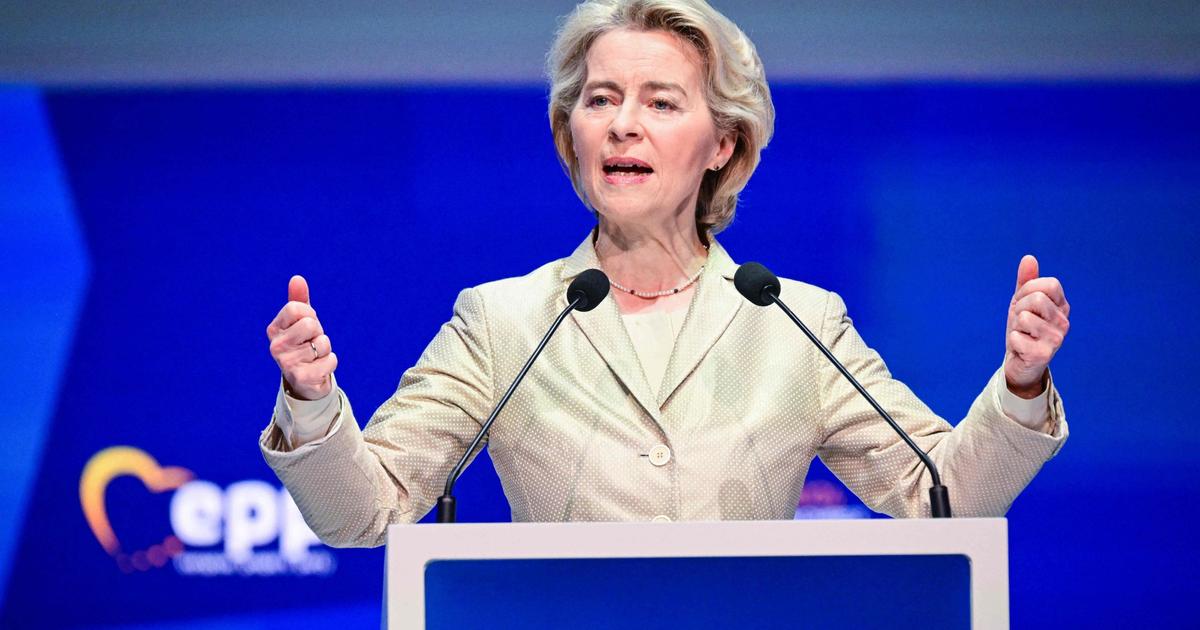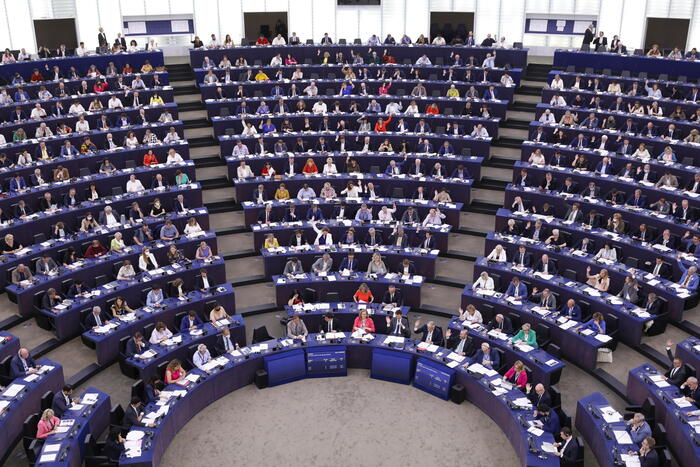Enlarge image
EU Commission President von der Leyen: Catching up for Europe
Photo: JULIEN WARNAND / EPA
A good speech needs an emotional moment, and Ursula von der Leyen obviously didn't want to rely on her rhetorical skills alone.
Even before her address on the State of the EU, it became clear who should ensure that special moment.
The head of the commission chatted with a young woman in the Strasbourg parliament for a noticeably long time.
Her name: Beatrice "Bebe" Vio.
At the age of eleven, the Italian lost both forearms and lower legs and has been wearing prostheses ever since.
A few years later she was European and world champion in fencing, and last year she won gold at the Paralympics for the second time.
"Your story is that of an ascent against all odds," enthuses von der Leyen.
The MPs applaud standing, the 24-year-old Vio is visibly touched.
"Bebe," said von der Leyen, showed: "If it seems impossible, then it can be done."
This sentence could also have stood above von der Leyen's speech.
Because it is full of demands, the fulfillment of which seems almost impossible.
Among other things, the EU should:
finally resolutely fight
the
climate crisis
by implementing the Commission's Green Deal proposals,
find
a
common security and defense policy
,
stand up to
China
with a global trade initiative
,
Bring
rule of law offenders
like Poland and Hungary to reason,
Massively expand
microchip production
and investments in
digital infrastructure,
which are increasingly indispensable for the economy
,
create
common health
structures
with tens of billions of euros
to protect the EU from another pandemic,
use the reconstruction after the corona crisis for far-reaching
structural
reforms
in the member countries
.
According to von der Leyen's message, the EU can do it.
Years ago, many would not have thought it possible that the EU would set up the “Galileo” satellite network.
"And now we have a navigation system for two billion smartphones worldwide."
Even the Corona vaccine strategy, which was initially tripped up by her authority, is now citing a success story: The EU is now one of the world's leading players in vaccinations, and only it has exported half of its vaccines to other countries.
Von der Leyen does not say that it mainly supplied rich countries - and at the same time complains that less than one percent of global vaccine doses were administered in poor countries.
Other parts of von der Leyen's speech are also not free from contradictions, for example when it comes to climate protection.
The "Fit for 55" package, with which the Commission intends to reduce greenhouse gas emissions by 55 percent in the EU by 2030 compared to 1990 levels, is the most extensive legislative package of its kind in the world to date. "The goal is simple," says von der Leyen.
"We'll price pollution, we'll clean up the energy, we'll have smarter vehicles and cleaner planes."
Fear of massive anti-climate protection protests
But there is little that is easy.
The main question is whether the member states will go along with it.
Because, diplomats say, it is slowly becoming clear what the Commission's plans really cost.
Representatives of the EU states are said to have made it clear to Commission Vice President Frans Timmermans recently that they fear unrest at home that is not unlike the yellow vest protests in France.
The problem of climate protection financing threatens to be exacerbated by the cooling of the relationship with China.
This week the commission plans to present a new Indo-Pacific strategy aimed at reducing Beijing's influence in the region.
Even if Commission officials emphasize that cooperation with partners and not a confrontation with China is in mind.
Von der Leyen is increasing the stakes by announcing an EU-wide market ban on products made from forced labor.
"Human rights cannot be sold at any price," she says.
She does not need to mention that this is particularly about the labor camps in China, in which millions of Uyghurs are imprisoned.
On top of that, von der Leyen has announced that he will soon present an initiative called “Global Gateway”.
It is unmistakably a response to China's “New Silk Road”, with which Beijing has also established partnerships in Europe or, as critics say, has created dependencies.
"We want to create a trustworthy brand," says von der Leyen.
The goal is "connections, not dependencies."
EU states should find the will to military action
Praise came from the German EU ambassador Michael Clauss, who had previously been stationed in Beijing and was already known there for his clear stance.
He welcomed the fact that von der Leyen "took up the idea of a rule- and value-based investment partnership," tweeted Clauss.
It is important "to shape globalization in a European way".
But in order to play a role to be taken seriously alongside China and the USA, the EU would have to act unanimously on foreign policy, of which little has been seen so far.
This also applies to security and defense policy.
"We now need a European defense union," says von der Leyen.
The disaster in Afghanistan recently made clear that it was necessary: after 20 years of war and billion-dollar investments by the West, the country has fallen back to the Taliban.
And the EU was not even able to secure the airport in Kabul to get its people out fast enough.
Demands for a rapid EU reaction force were promptly made again.
Sure, it could be "part of a solution," says von der Leyen.
But even more important is the political will to deploy such a force.
What, asks von der Leyen, is the use of the best emergency services, "if you are never ready to use them?"
Last but not least, Germany is a brake block, where the Bundestag has to approve every military operation outside the country.
The outcome of the federal election is therefore seen in Brussels as one of the deciding factors in how quickly the EU can advance on the path to a defense union - if at all.
In addition, it is not that the EU does not have its internal problems as well.
The conflict that has been simmering for years between the Commission and countries like Hungary and Poland over the dismantling of the rule of law there has recently escalated dramatically, and a solution is currently not in sight.
Von der Leyen is at least rhetorically resolute: The dialogue with the rule of law offenders is "not an end in itself", it is combined with "decisive action," she said, referring to the recently requested financial penalty against Poland. The head of the Commission indicated that she also wanted to use the mechanism that has been anchored in the EU budget since January, which makes it possible for constitutional offenders to withdraw EU funding. "The European budget is the future of our Union in figures," said von der Leyen. "That's why he needs to be protected."
From whom, however, does not say von der Leyen.
For some MEPs that is not enough.
"Without addressees and concrete steps, your words remain toothless," said the FDP politician Moritz Körner.
Von der Leyen "spoke nicely about the rule of law again, but didn't say much," criticized the Green MP Sergey Lagodinsky.
The Commission must finally activate the budgetary mechanism against Poland and Hungary.
But that is by no means easy - in the end, 15 of the 27 EU countries with at least 65 percent of the EU population would have to agree to a withdrawal of funds.
In other areas, such as security and defense, foreign and financial policy, there is even a need for unanimity in the EU.
For Beatrice Vio, the responsible umbrella organization has changed its rules to enable her to fight with the foil on the prosthesis.
In the EU, however, a unanimous decision would again be necessary to abolish the unanimity requirement.
Smaller countries would have to give up their right of veto, others would even have to hold referendums.
After all: Von der Leyen's prerequisite for a miracle à la Vio - "if it seems impossible" - would then be fulfilled.









/cloudfront-eu-central-1.images.arcpublishing.com/prisa/RC4B72FDDQXT46YR3YBE2AOT4A.jpg)